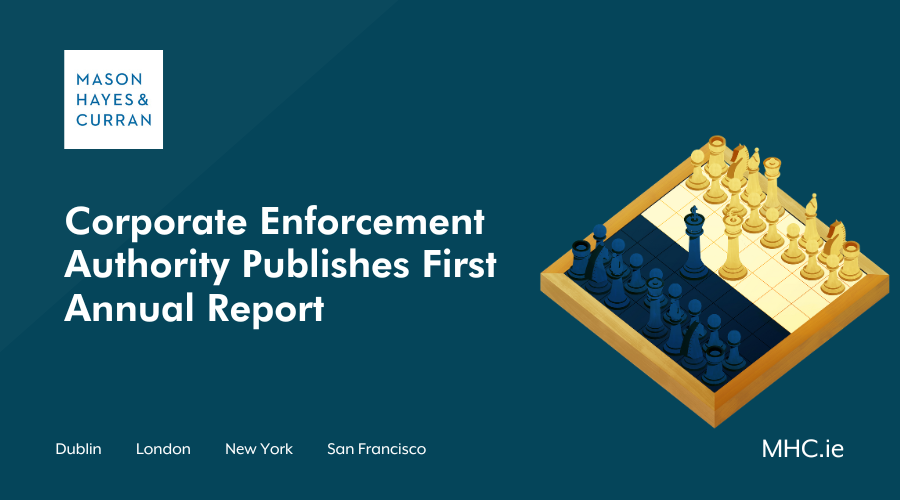Corporate Enforcement Authority Publishes First Annual Report

The Corporate Enforcement Authority has published its first Annual Report. The report covers the period since its establishment in July 2022 until the end of December 2023. The report highlights the increasing role of the CEA as a regulator in corporate Ireland. Our Investigations & White Collar Crime team reviews key case studies from the report that highlight the importance of companies and their officers complying with their statutory duties under the Companies Act 2014. In addition, they look at the repercussions if they fail to do so.
The Corporate Enforcement Authority’s (CEA) has published its first annual report. The Report provides an update on the implementation of the CEA’s strategy over the previous 18 months. This strategy encompasses the following three core pillars:
- Embedding governance structures, building operational capability, and establishing presence
- Effective advocacy and influencing, and
- Operating effective systems of proportionate, robust, and dissuasive enforcement
The CEA implements its strategy through several means, including:
- Securing compliance through administrative measures
- Civil enforcement measures, and
- Criminal enforcement measures
The Report shows that the CEA received over 470 complaints from members of the public, as well as over 300 statutory reports from auditors, examiners, and process advisors in its first 18 months.
The report also includes 17 case studies that illustrate the breadth of the CEA's powers of enforcement. They demonstrate a considered and graduated approach towards the deployment of those powers.
For example, in one case study the CEA received an auditor’s indictable offence report indicating that the company had incorrectly claimed audit exemption, as well as an exemption from preparing consolidated group financial statements for a previous financial year. The auditor’s report outlined the remedial measures that the company’s directors had taken to rectify the position. These measures were verified by the CEA. In this case, a warning letter was issued to the company and its directors. This warning made clear that a repeat offence would likely be dealt with differently.
In a separate case study included in the Report, the CEA found it necessary to exercise its civil powers of enforcement. Here, a newly appointed liquidator was obliged to provide the CEA with a first report within 6 months of their appointment. However, despite being issued with several reminders and formal notices to comply with this obligation, the liquidator did not submit the required report. The CEA applied to the High Court for an Order directing the liquidator to comply with the obligation to file the report as required. After the liquidator had been served with the proceedings, they finally engaged with the CEA and the outstanding report was filed. The matter was then struck out on consent. The CEA was awarded its costs incurred in having to issue the High Court proceedings.
The Report also sets out examples of certain criminal enforcement measures undertaken by the CEA in cases where the indications of wrongdoing were suggestive of activity that could constitute criminal offences under company law, such as:
- Furnishing of false information to the CRO
- Impersonation of auditors by persons not so qualified/authorised
- Acting as a director while bankrupt, and
- Fraudulent trading
These enforcement actions included the prosecution of offences by way of summary proceedings and through the referral of matters to the Director of Public Prosecutions.
The Report highlights how the CEA has an extensive suite of statutory powers at its disposal. These include the power to require production of documents and powers of search and seizure, as well as the power of arrest through CEA officers who are seconded members of An Garda Síochána. For example, during the reported period, the CEA secured 107 court orders and 5 search warrants, took 213 witness statements, and effected 12 arrests.
The Report also demonstrates how the CEA has a supervisory role in the corporate insolvency process, with liquidators having statutory reporting obligations to the CEA. In the first 18 months of its existence, the CEA secured the restriction of 80 company directors and the disqualification of a further 27 company directors based on liquidator reports. The operation of a separate stream of enforcement designed to address the irresponsible behaviour of allowing companies to be struck off the register for failure to file the required returns with the CRO resulted in a further 10 directors being disqualified.
Conclusion
The Report is a stark reminder to companies and their officers of the importance of compliance with the Companies Act 2014. The Report is full of examples of instances where companies and/or directors fell short of their duties under the 2014 Act, and the repercussions of those shortcomings.
The Report also sets our further proposed enhancements to the CEA’S capacity to investigate suspected breaches of company law included in the provisions of the General Scheme of the Companies (Corporate Governance, Enforcement and Regulatory Provisions) Bill 2024 (the 2024 Bill). These proposals to extend the investigative powers of the CEA include:
- The conferral of new powers of investigation in information and evidence gathering, and
- Increased information sharing across investigative and regulatory agencies
It is clear from the Report and the 2024 Bill that the CEA’s role in corporate Ireland is ever increasing. The previous approach to corporate enforcement whereby companies would ask for forgiveness rather than permission when it came to certain breaches of company law is no longer a suitable approach for companies and their officers to take when it comes to their duties under the 2014 Act.
People also ask
What is the CEA? |
The CEA is Ireland’s Corporate Enforcement Authority. It supervises and promotes compliance by Irish companies with company law. |
How are companies regulated in Ireland? |
Irish companies are predominantly regulated by the Companies Acts 2014. |
Who investigates white collar crime in Ireland? |
The CEA, in conjunction with the Director of Public Prosecutions, investigates and prosecutes breaches of Irish company law. |
For more information and expert advice, contact a member of our Investigations & White Collar Crime team.
The content of this article is provided for information purposes only and does not constitute legal or other advice.
Share this:



